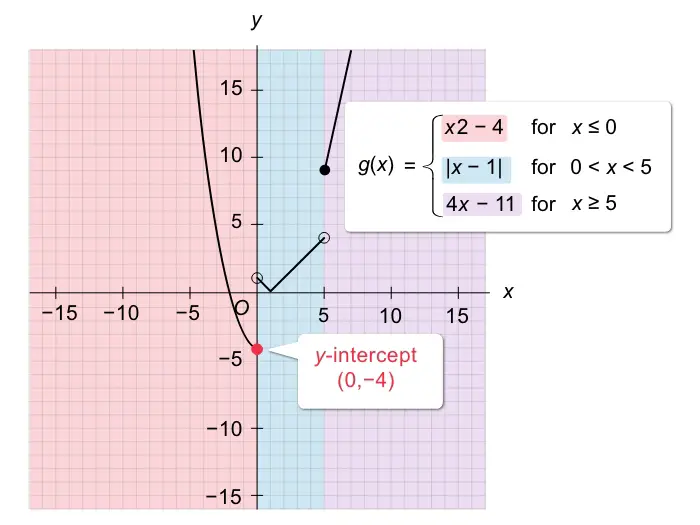The ACT® Math is 1 of the 3 component tests of the ACT and contributes 33.33% to your final ACT score. If you are preparing for the upcoming ACT Math test, it is crucial that you nail this section to boost your total ACT score as much as possible. Let’s walk through the ACT Math format and topics.
ACT Math Format and Topics
The ACT Math Test evaluates the mathematical skills you learned in your high school math courses up to the start of grade 12. The test runs for 50 minutes, during which you have to answer 45 multiple-choice questions (MCQs), giving you just 54 seconds to answer each question.
You will get a mix of self-contained and set-based questions, meaning some questions are standalone, while other questions come in a set pertaining to a single graph, chart, or piece of information. While the ACT Math section does not provide you with a formula sheet at the time of the test, you are allowed to use your calculator throughout the test.
What is Tested on the ACT Math Section?
The test material covers essential topics for introductory math courses in college; therefore, you will be required to have a thorough knowledge of basic ACT mathematical formulas and computational skills. There are three broad categories of questions on the ACT Math Test:
- Preparing for Higher Math (57-60%): This category covers the most recent mathematics that students are learning, involving algebra, geometry, and trigonometry.
- Number and Quantity (7-10%): You will need to study and practice working with various numerical forms to do well on these questions. ACT.org states these questions include real, complex, integer, rational exponents, vectors, and matrices. Note that this is the least commonly tested topic in the ACT Math exam.
- Algebra (12-15%): To do well on these questions, you will need to understand different types of equations, such as linear, exponential, radical, and polynomial expressions.
- Functions (12-15%): Your ability to define functions, write in function notation, apply functions, and represent functions in various forms is necessary to solve these questions. You will likely have to translate different kinds of functions and evaluate relationships in graphs.
- Geometry (12-15%): These questions require skills in assessing the composition of shapes and the ability to define relationships. You can also expect some of these questions to ask you to solve for missing values in triangles, circles, and other figures.
- Statistics and Probability (8-12%): These questions test your skills in assessing sampling methods and relationships in data. Expect to find the measure of center and pinpoint relationships (like the spread of distribution in the data).
- Integrating Essential Skills (40-43%): This category of questions will focus on elementary topics that you would have covered in high school. Some skills tested are rates, percentages, proportional relationships, surface area, volume, averages, and medians.
- Modeling (≥ 20%): This question category assesses your skills in creating, understanding, and evaluating models and correcting them if required. These models pertain to any of the topics covered in the Math section.
Our guide to the ACT Syllabus will help you learn more about each assessment category tested on the ACT Math section.
Is the ACT Math Hard?
You get 54 seconds per question on the ACT Math Test, and time management becomes key. While there is no definitive way to answer whether ACT Math is hard or easy, looking at the ACT Math scores from the past 3 years (2022-24) can give you an idea of how challenging it might be.
The table below lists the total number of students who took the ACT between 2022 and 2024, along with the percentage of students who earned a perfect score in ACT Math and those who met the college readiness benchmark set by ACT.
| Year | Total Students | Avg. ACT Math Score | Students Who Scored a 36 | % of Students Who Met the College Readiness Benchmark |
|
|---|---|---|---|---|---|
| Number | % Age | ||||
| 2024 | 1,374,791 | 19.0 | 5,281 | 0.38% | 29 |
| 2023 | 1,386,335 | 19.0 | 4,248 | 0.30% | 30 |
| 2022 | 1,349,644 | 19.3 | 4,807 | 0.35% | 31 |
From the above data, the average ACT Math score has declined over the past 3 years, which may indicate that ACT Math has gotten progressively harder to ace. There has also been a steady decline in the number of students who met the college readiness benchmark.
But worry not; we’ve got you covered! You can ace the ACT Math Test with a dedicated study schedule and by taking ACT practice tests. Also, invest time to build a strong foundation of core math topics and concepts. With repeated practice, you may be able to predict which skill is being assessed and improve your time management skills.
Make sure to carry a calculator listed under the ACT calculator policy to avoid your device being seized at the test center.
Does the Math Section on the ACT Get Progressively Harder?
Yes. Unlike the ACT English Test, questions become progressively harder toward the end of the math section. Since time is so important in ACT Math, try to spend less time on the questions at the beginning of the section so you have more time for the harder questions at the end.

Is the ACT Math Harder Than the SAT Math?
The simple answer is that it depends on your skills, academic strengths, and weaknesses. ACT and SAT Math test you on similar topics, including trigonometry, algebra, and arithmetic. However, the test format and question types for these tests are different, and that may impact your success on the SAT or the ACT. Below are 4 key factors that can determine whether 1 test is harder than the other:
| Criteria | ACT | SAT |
|---|---|---|
| Test Syllabus | Covers a broad range of topics, including trigonometry and matrices. | Focuses heavily on algebra and problem-solving skills. |
| Time Per Question | ACT has more questions than SAT Math, giving you 54 seconds per question. | There are fewer questions, giving you 82 seconds per question. |
| Question Type | It is a multiple-choice questions test with 4 options for each question. | It has both multiple-choice questions and grid-ins. |
| Calculator Usage | Allows approved calculator usage throughout the test. | Only during specific sections for offline versions. |
Both tests are designed to measure a student's proficiency in math and require a similar level of knowledge and problem-solving ability. Ultimately, the best way to determine which test may be better for you is to take practice tests for both and compare your performance and comfort level.
Calculating ACT Math Score
Your ACT Math score is calculated on a scale of 1 to 36. This scaled score is derived after calculating the raw score based on the total number of questions you answered correctly. While there is no passing score for ACT Math, the ACT has established a college readiness benchmark that indicates the minimum test scores required for students to have a reasonable chance of succeeding in college. After calculating your scaled Math Test score, it is added to your English and Reading test scores and averaged (divided by 3) to determine your final ACT score.
Our ACT scoring guide is here to help you learn more about how the ACT Math Test is scored.
ACT Math Review Tips
When it comes to performing well on the ACT Math section, you can set yourself up for success with a plan to effectively manage time, master the fundamentals, and reinforce those with repeated practice. Here are a few review tips to give you a head start:
-
Time Management
There are 50 questions and only 45 minutes in which to complete them, leaving you with 54 seconds per question. With so little time to study and solve the problems, you don’t have time to second-guess or check your answers. Taking timed ACT mock tests will help you develop the necessary time management skills to complete the section in time.
-
Master the Fundamentals
You’ll be tested on your knowledge of mathematical concepts, analyzing, and problem-solving skills. Mastering the fundamentals is the key to acing the ACT Math section.
-
Practice Makes Perfect
You’ve heard us say it before, but practicing for any timed test is the key to succeeding in it. Taking regular practice tests will improve how you effectively manage time during a timed test and perform accurately under pressure.
Streamline your studies using UWorld’s ACT Prep Course, which offers performance tracking tools, detailed answer explanations, and thousands of sample questions. You can use the performance tracking tools to pinpoint weak areas throughout your practice work. You can also take advantage of the detailed answer explanations to dive deeper into the topics you struggle with. Preparing for the Math section will take lots of practice, so take this free ACT practice test to check where you stand. Use these study tools to maximize your study plan and reach your full scoring potential!

Frequently Asked Questions (FAQs)
Can you use a calculator on the ACT Math test?
Yes, you can use a calculator in the ACT Math Test.
Can you use a graphing calculator on the ACT Math section?
Yes, you can use a graphing calculator on the ACT Math as long as its model and make are accepted by ACT’s calculator policy.
Is a low ACT Math score bad for an interest in engineering?
A low ACT Math and STEM score can reduce your chances of getting into an engineering college and obtaining scholarships. However, you can always retake the ACT and improve your score.
Read More About the ACT Test
Are you ready to take the ACT English Test? Our guide can help you understand how ACT English is structured and what questions it tests. We'll also walk you through the scoring, topics, and more.
About ACT ReadingDiscover the test's format, syllabus, and scoring pattern so you can excel on your exam! We will discuss question types and share some review tips to kickstart your preparation.
About ACT ScienceHere’s an all-in-1 guide that explores the format, syllabus, question types, and scoring pattern of the test. We'll also give some review tips to help you prep smarter.



